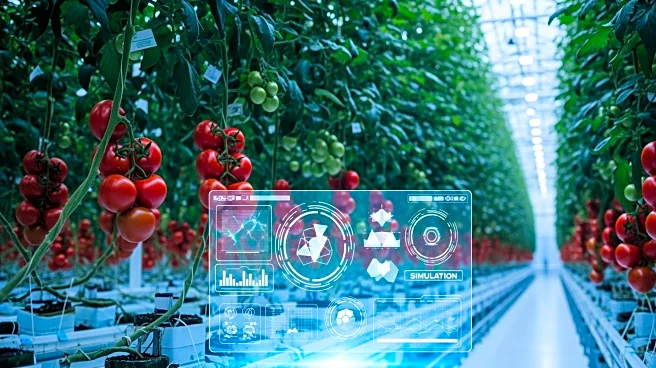What's Happening?
Chinese scientists have developed a digital twin greenhouse system to improve the efficiency of tomato harvesting. This system, led by researchers from the Agricultural Information Institute of the Chinese Academy
of Agricultural Sciences, uses a slidable depth camera mounted on a harvesting robot to create a high-fidelity 3D digital twin of the greenhouse. This digital twin accurately captures the spatial distribution and growth states of tomatoes, allowing for optimized harvesting strategies. The system significantly reduces average picking time and collision occurrences, enhancing the overall performance of automated tomato harvesting.
Why It's Important?
The development of digital twin technology for tomato harvesting represents a significant advancement in precision agriculture. By improving harvesting efficiency, this technology can lead to increased productivity and reduced labor costs in greenhouse farming. It also demonstrates the potential for digital twin systems to be applied to other crops, offering a scalable solution for intelligent agricultural systems. This innovation could drive the transformation of large-scale agriculture, making it more sustainable and efficient, and potentially influencing global agricultural practices.
What's Next?
The research team plans to explore the use of digital twin technology for other crop varieties, aiming to enable low-cost and high-efficiency training and evaluation of harvesting decision algorithms. This could lead to broader applications of the technology in precision agriculture, further enhancing the efficiency and sustainability of crop production. The continued development and deployment of digital twin systems may attract interest from agricultural technology companies and investors, potentially leading to collaborations and commercial opportunities.
Beyond the Headlines
The integration of digital twin technology in agriculture highlights the growing importance of data-driven solutions in farming. It raises questions about the future of agricultural labor and the role of automation in food production. As technology continues to advance, ethical considerations regarding the displacement of traditional farming practices and the impact on rural communities may arise. Additionally, the adoption of such technologies could influence global food security and environmental sustainability efforts.











